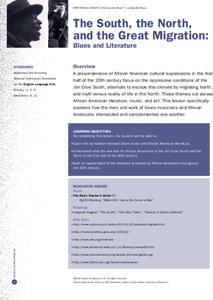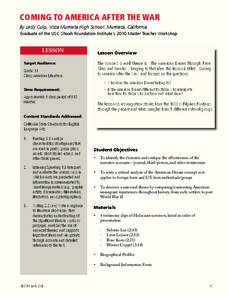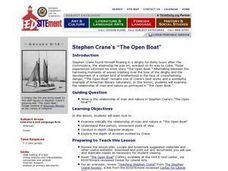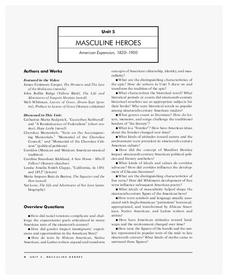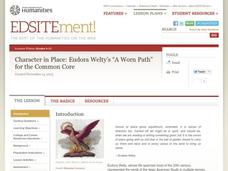National Endowment for the Humanities
Literary Genres in “Moby-Dick”
Moby Dick is more than a whale of a tale narrated by Ishmael. A lesson studying Herman Melville's classic novel asks readers to examine the different genres the author weaves into his story. Instructors model how to conduct a stylistic...
Curated OER
Crane, London, and Literary Naturalism
Young scholars read London's "To Build a Fire" and Crane's "The Open Boat" and compare and contrast the authors' style as they explore the genre known as American literary naturalism.
Curated OER
Lesson 1: Faulkner's The Sound and the Fury
I love Faulkner, his experimental style and stream of consciousness are so exciting. Your learners can analyze William Faulkner and his novel, The Sound and the Fury by defining his place in American literary history and exploring his...
National Endowment for the Humanities
The Music of African American History
High schoolers examine role spirituals have played in African American history and religion, examine Harriet Tubman's use of spirituals in her work, explore power of spirituals in Civil Rights Movement, and work with oral tradition,...
Curated OER
The South, the North and the Great Migration: Blues and Literature
Here is a complex lesson plan that interweaves the history of the Jim Crow South and the Great Migration with the study of poetry, art, and blues music from the Harlem Renaissance. The plan helps young historians develop a deep...
Smithsonian Institution
Latino Expression
How much of your daily life is influenced by Latin American music? Take a listen—the answer may surprise you! High schoolers keep a journal to note any instances they see Latino culture represented, including the media, their school, and...
University of Southern California
Coming to America After the War
As part of their exploration of the American dream, class members examine primary source materials to compare immigrant experiences of those arriving early in our country's history to those arriving in the US after World War II. To...
Curated OER
Introducing the Essay: Twain, Douglass, and American Non-Fiction
Young scholars analyze American essayists Mark Twain and Frederick Douglass in an introduction to American literary non-fiction writing. In this essay history lesson, students identify methods for writing essays. Young scholars read and...
Japan Society
Changing Times, Changing Styles: New Japanese Literary Styles of the Late Nineteenth Century
Focusing on Doppo's "Unforgettable People" and late nineteenth century Japanese literature, this resource also leads to discussions of form being dictated by content. Explore the development of new literary styles first-hand by...
Penguin Books
A Teacher’s Guide to the Signet Classics Edition of Mary Shelley ’s Frankenstein
Contrary to popular belief, the monster's name in Mary Shelley's Frankenstein is not Frankenstein. A teacher's guide for the novel helps readers make sense of key details in the text, define vocabulary words, and discuss prominent...
Curated OER
Exploring Race Through Literature
Provide your class with an opportunity to examine race through a variety of literary works. They read and analyze a chosen poem, interview, speech, or story describing race in America. They then use key words from the original work to...
Curated OER
Crane, London, and Literary Naturalism
Students identify the key characteristics that comprise American literary naturalism in Jack London's "To Build a Fire" and Stephen Crane's "The Open Boat." In this naturalism analysis instructional activity, students identify...
Curated OER
Stephen Crane: The Open Boat
Students explore the genre of American literary naturalism by reading,"The Open Boat" by Stephen Crane. They examine the relationship of man and nature through analysis of the characters, narration and descriptive vocabulary.
Annenberg Foundation
Masculine Heroes
What were the driving forces behind American expansion in the nineteenth century, and what were its effects? Scholars watch a video, read biographies, engage in discussion, write journals and poetry, draw, and create a multimedia...
Smithsonian Institution
Affirmation, Assimilation, and Acculturation: Middle School
Latin American culture is deeply embedded in American culture as a whole. From the Latin rock scene in San Francisco to the hip-hop world of New York, Latin American artists have influenced every genre of modern music. Learn about the...
Curated OER
The American Dream Poetry
Students analyze how poetry can reveal themes of 'The American Dream.' In this poetry themes lesson, students discuss the elements of poetry and define imagery. Students read 'Lost Sister' by Cathy Song and complete a related worksheet....
National Endowment for the Humanities
Character in Place: Eudora Welty’s “A Worn Path” for the Common Core
How do writers use the interaction between elements like characterization and setting to create meaning? Readers of "A Worn Path" create a series of comic book-style graphics of Eudora Welty's short story and reflect on how Welty uses...
Curated OER
Cinderella Folk Tales: Variations in Plot and Setting
Young scholars examine plot and setting of Cinderella, and how it changes as it is translated into different cultures, discuss universal literary elements of the Cinderella story, and write narratives with original settings and plots...
Curated OER
Everyone's a Critic: Analyzing Sitcoms as Cultural Texts
Start by defining the word sitcom with the goal of launching a discussion. What exactly is a sitcom? How is a sitcom different from sketch comedy, drama, and reality television? Class members give examples, remember storylines they've...
Museum of Tolerance
Just What Kind of American Are You?
Your parents were both in different countries. You were born in the US. Documents and application forms ask you to identify your racial or ethnic classification. Which box do you check? Class members collect documents and application...
National Endowment for the Humanities
Tales of the Supernatural
Scary stuff! Whether approached as the first horror story or a "serious imaginative exploration of the human condition," Frankenstein continues to engage readers. Here's a packet of activities that uses Mary Shelley's gothic novel to...
Curated OER
The Breaking of Charity
The danger of mob mentality is on display in The Crucible by Arthur Miller. Get your class thinking with some challenging quickwrite questions, then assign characters from the play to be read aloud altogether. Links to worksheets for...
Curated OER
African-American History and Culture in the English Classroom
Ninth graders identify and recognize characteristics of nonfiction in literary works, explore language and culture of Gullah people, compare and contrast purposes of spirituals and quilts in terms of their relationships to escape from...
Curated OER
The Eight Immortals
Students compare and contrast the Eight Immortals with American super-
heroes, such as Superman, Wonder Woman, and Aquaman while examining the literary genre of folktales and its connection to art.






